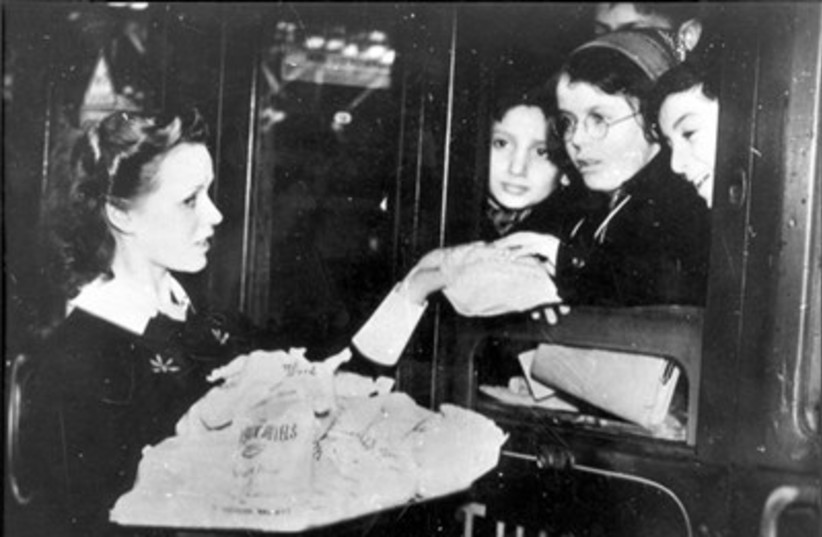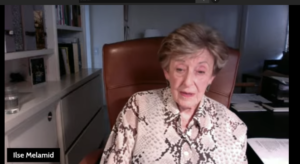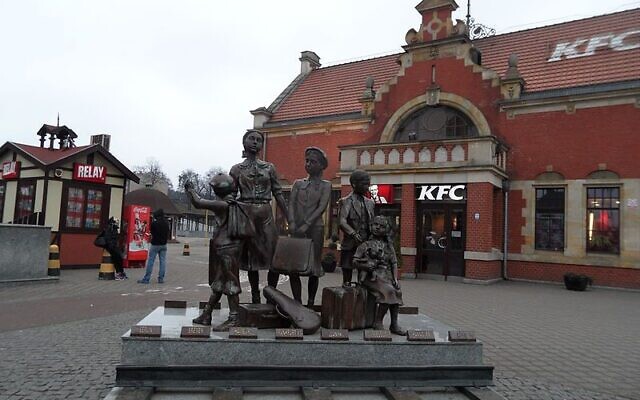Holocaust service to be held at new Kindertransport statue in Harwich
Posted on January 21, 2023
A SPECIAL Holocaust memorial service will take place in Harwich for the first time following the unveiling of Harwich’s Kindertransport memorial.
Following the unveiling of the Kindertransport memorial at Harwich Quay last year, Harwich Town Council said the site would be a fitting focal point for Holocaust Memorial Day.
Harwich mayor Ivan Henderson said: “The Kindertransport Memorial recognises Harwich’s role in the protection of many thousands of Jewish children through the Kindertransport but it also offers a focal point for us to remember and reflect on the horror of the Holocaust.
Related Website »
Lowestoft: Holocaust memorial ceremony and new bench to be unveiled
Posted on January 18, 2023
Wreaths are due to be laid as a ceremony commemorating Holocaust Memorial Day will be held in Lowestoft.
At the spot where hundreds of young Jewish refugees arrived in 1938, a special service of remembrance will take place on Friday, January 27 as Lowestoft rail station hosts a special ceremony.
Everyone is welcome to attend the service of reflection, which will take place inside the Parcels Office at the town’s railway station on January 27 at 10am. People will gather to remember the Holocaust and the role the town played more than 80 years ago when more than 500 children arrived at Lowestoft station as part of the Kindertransport initiative.
Related Website »
Who are the Holocaust survivors in UK Parliament’s memorial day portraits?
Posted on January 10, 2023

Children evacuated from Germany on the Kindertransport in 1938/1939 are given candies in Southampton, England (photo credit: MAARIV)
The UK Parliament is set to exhibit 30 portraits of people affected by the Holocaust, genocide or identity-based persecution in honor of Holocaust Remembrance Day which is marked internationally at the end of the month of January.
Four passengers of the Kindertransport are featured in the portraits: An ink and dipping brush drawing of couple Ann and Bob Kirk by Ellie Jones, a drawing of Bronia Snow by Ali Simmons, and a drawing of Fay Healey by 10-year-old Cerys.
Ann and Bob were on separate Kindertransports and only met later in life after the war in 1950. The two married and had two children.
Bronia was on a transport from Prague when she was 11 and was sent to a foster family. She never saw her biological family ever again. She told Simmons that she struggled with faith after the horrors of the Holocaust, but Simmons noted that “Bronia seems resilient, kind and curious.”
Fay Healey was on a 1938 transport from Poland at the age of 11. As an adult, Fay was a lollipop lady (a person who helps children cross the road when they are on the way to and from school) at Lander Road Primary School and St. Elizabeth Primary School.
Related Website »
Man honoured for Holocaust education says Kristallnacht saved his life
Posted on December 31, 2022
92-year old Michael Brown arrived just days before war was declared and worked with Holocaust Educational Trust to tell his story
Kristallnacht was a wave of Nazi-coordinated violence against Jews across Germany in November 1938 that is so called because of the debris left from the destruction of Jewish properties and synagogues.
As a result of the violence, the British Government began to allow unaccompanied Jewish children into the country as refugees – a movement that came to be known as the Kindertransport. Michael Brown, 92, was one of those children, arriving just days before Britain’s declaration of war against Germany and the cessation of the transports.
“In fact, I always think about how lucky I am because probably, I was on if not the very last, the second to last transport before the war began. I came to England on August 23, 1939. So I just squeezed in.”
Related Website »
Kindertransport bench tells children’s testimonies
Posted on December 15, 2022
A TALKING bench that plays the testimonies of Kindertransport children has been unveiled in Harwich.
The bench has been installed by the Harwich Kindertransport Memorial and Learning Trust in the Mayor’s Garden off Main Road.
It includes stories told by those who were evacuated from Nazi occupied Europe to safety in Britain.
The humanitarian rescue mission, which started in December 1938 and continued until the outbreak of the Second World War, saved approximately 10,000 children.
Related Website »
Grandmother’s Holocaust years detailed in journal
Posted on December 8, 2022
The anti-Semitism that fanned the flames of the Holocaust is “still here — I feel like you see it more and more every day,” said Courtney Doi, which is one of the reasons she said she is so intent on telling the story of her grandmother, Judith Klein, and her family.
“I am the chosen family historian, and getting her words out is very important to me,” said Doi, who discussed Klein’s journey out of Germany as a teenage refugee, her extended family’s experiences across Europe before, during, and after World War II, and Doi’s own travels to Germany to further understand her family history Wednesday at the Fayetteville Public Library.
“It’s a miracle I’m here to tell this story, [and] it makes me so happy that folks here — and in other pockets of the country — get to know [Klein’s] story.”
Doi, who lives in North Carolina, discusses her grandmother and family often at schools and other events, as she believes it can be easier for some people to comprehend the Holocaust through the personal tale of one individual, she said. She’s heard people say, “it must be real if it happened to this person.”
Klein was one of thousands of children and adolescents — she was the 680th youth to be signed up for the Kindertransport — the operation to evacuate Jewish children from Nazi-controlled areas of Europe to the United Kingdom between 1938 and 1940 — who escaped Germany as the country’s persecution of Jews became increasingly pernicious, Doi said.
Related Website »
Jewish propaganda, antisemitism & white supremacists on the rise
Posted on December 7, 2022
For many in Texas, it’s a hard pill to swallow. Antisemitism and white supremacy is seeing an increase and is a reality to many in the Lonestar State.
“We’ve lived a long life, we see it every day,” said Holocaust survivor Bert Romberg.
Bert Romberg and his sister Magie Furst were part of the kindertransport and migrated to the U.K. They would later settle in the U.S. Both are in their 90s and concerned with what’s happening in today’s world.
“There were 6 million Jews that died and a million and a half kids like us,” said Bert Romberg.
Related Website »
St Andrews honour: The remarkable story of Lord Alf Dubs’ escape to the UK from Nazi horror
Posted on December 4, 2022
Michael Alexander speaks to Lord Alf Dubs – a child refugee who fled the Nazis before World War Two, becoming an MP, CEO of a refugee charity and member of the House of Lords – and who has now been honoured by St Andrews University.
He is the Labour peer who fled the Nazi occupation of Czechoslovakia through the Kindertransport scheme, which rescued so many Jewish youngsters before the Second World War.
Lord Alf Dubs, who received an honorary Doctor of Law (LLD) from St Andrews University on Tuesday November 29, has spent his career standing up for the rights of refugees – especially children.
Related Website »
Journey to a New World: Edith Maniker’s Life After the Kindertransport
Posted on December 4, 2022
Today marks the 84th anniversary of the Kindertransport, the rescue operation that beginning in 1938 helped nearly 10,000 Jewish children escape to the United Kingdom from Germany and Nazi-controlled territory in Austria, Czechoslovakia and Poland.
A young Edith Grunbaum was among the children ferried to safety. She told her story to USC Shoah Foundation in 1998 in testimony now housed in the Visual History Archive. Last year, she interviewed for Dimensions in Testimony, the interactive biography exhibit that enables people to ask questions that prompt real-time responses from pre-recorded video interviews with Holocaust survivors and other witnesses to genocide.
Related Website »
Anita Weisbord
Posted on December 3, 2022
As we remember December 2, 1938, the day that the first Kindertransport arrived safely to Harwich, England, and the day that KT2 David Meyerhoff named World Kindertransport Day, we think of Kindertransport Survivor Anita Weisbord from Vienna, who has died this week at 99 years. A committed educator, she shared her story widely. This short clip is beautifully moving.
https://bit.ly/AnitaWTalk
Wales hospitality to refugees fleeing the Nazis remembered
Posted on November 5, 2022
An exhibition tracing the history of refugees in Wales, from those fleeing the Nazis in 1930s up to the present day, is going on display next week.
Refugees from National Socialism in Wales: Learning from the past for the future will be on display at Aberystwyth Arts Centre from 10 November to 29 January, after which it will travel to the Senedd and Pierhead Galleries in Cardiff between February and April 2023.
It tells the stories of those who found sanctuary in Wales after fleeing from central Europe due to the National Socialist dictatorship, and draws parallels with modern-day refugees who are making Wales their home.
Related Website »
How a Kindertransport Saved and Shaped My Mother-in-Law’s Life
Posted on November 1, 2022
Watching Ukrainian women and children flee Putin’s death machine as men remain to fight evokes a heart-rending image from my family narrative 84 years ago.
In 1939, my wife’s maternal grandparents parted from their beloved daughters, Gertrud, 8, and Erika, 10, at the railroad station in Graz, Austria. The girls boarded a kindertransport (transport for children) to Sweden. Barred from the platforms as Jews, their parents strained for a final glimpse at their departing daughters.
 Trude and Maja, 1939
Trude and Maja, 1939
Sundering the Silber family devastated the adults and bewildered the girls but it saved the daughters from the Holocaust. It also imbued Gertrud, called Trude, who would be my mother-in-law, with lifelong pangs of abandonment and want. Too young to comprehend the situation, she could not understand the absolute necessity of her parents’ action. She did not experience it as an act of love.
Related Website »
Stockton endowed scholarship honors local Holocaust survivor
Posted on October 25, 2022
GALLOWAY TOWNSHIP – For most of her life, not many people knew that Ruth Kessler was a survivor of the Holocaust.
“I was the only one who knew her Holocaust story,” her daughter Michele Taroff said. “She never talked about it. My brothers never knew.”
And Kessler continued to keep mostly quiet about her experience as part of the Kindertransport for many years until her granddaughter, Dani Hong, approached “Mom Mom” in eighth grade to ask if she would talk to her class.
“I saw her face turn white and she just looked at Dani and said, ‘OK.’ And that was the beginning of her telling her story, which she never thought was important enough,” Taroff said.
Kessler’s story about being separated from her mother and sister and sent from her home in Vienna to England in 1939 as part of the Kindertransport has become very important, not just to her family but to hundreds of students she spoke to until her death in 2016.
Her important story and family’s legacy will live on with Stockton students as part of the Ruth Fisch Kessler Memorial Endowed Scholarship. Taroff and her husband, Scott, have set up the scholarship, which will go to a Stockton undergraduate student with a demonstrated interest in Holocaust and genocide studies. The family announced the gift in a ceremony at Stockton’s Sara & Sam Schoffer Holocaust Resource Center earlier this month.
Related Website »
Bringing the short film Night Of The Broken to life
Posted on October 19, 2022
One tiny beacon of hope that emerged during [the World War II] period was the Kindertransport, a train service that took Jewish children fleeing Nazi persecution, and rehomed them predominantly in British homes that had been volunteered by British families. These poor frightened children were separated from their parents and travelled alone, some just babies, guided by a network of volunteers to safety. They represented a fraction of the children in peril, the majority of whom never made it out of that horror alive. Which is where development of Night Of The Broken took shape. The idea of a Jewish Kindertransport child who had grown up in England to become a doctor in the 1960s. What kind of person had she become? What was her legacy? How did she feel about surviving whilst so many of her people had died?
Related Website »
Kindertransport: Story of Second World War rescue effort comes to Ledbury theatre
Posted on October 8, 2022
The story of an organised rescue effort to save children from Nazi occupation is coming to Ledbury this month. Ledbury Amateur Dramatic Society, known as LADS, will be performing Kinderstransport from Thursday, October 20 to Saturday, October 22 at the Market Theatre.
In the play, nine-year-old Eva ends up in Manchester and when her parents fail to escape she changes her name and begins the process of denial of her roots. It is only years later when her own daughter discovers some old letters that Eva is forced to confront the truth about her past.
Tickets are £11 (£8 for students) and are available from the Market Theatre box office.
Related Website »
Theatre Department kicks off its 2022-2023 season with Diane Samuel’s “Kindertransport”
Posted on September 30, 2022
UNCW’s Theatre Department kicks off its 2022-2023 season with Diane Samuel’s Kindertransport. The production looks at the life of a young child who is forced to leave Nazi-occupied Germany and sent to live with a foster family in Britain, uncertain of what her future will hold.
Director, Dr. Charles Grimes, says as we read news stories and think about what’s happening now, this story becomes very relevant. Grimes explains it reminds you that everything you read about in the headlines, is actually happening or happened to an individual somewhere.
“Telling us something about how easy it is to lose something as a person, to the forces of history. And it’s a smart play about how people in society kind of accept what’s going on even if that’s leading in the direction of fascism or inhumanity. And it just shows how those forces affect individual people.”
Kindertransport is in the Mainstage Theatre at the UNCW Cultural Arts Building. Shows run Thursdays through Saturdays at 8 pm and Sundays at 2, starting tonight and ending on October 9th.
Related Website »
Kind Ilse Melamid speaks on PBS panel: NO LONGER UNIMAGINABLE: A Conversation with Holocaust Survivors.
Posted on September 24, 2022
KTA Board member Kindertransportee Ilse was brilliant, highlighting the work of the Quakers and the importance of hearing refugee’s stories on the panel: NO LONGER UNIMAGINABLE: A Conversation with Holocaust Survivors.
To watch: https://bit.ly/PBSTalk





 Trude and Maja, 1939
Trude and Maja, 1939